WHETHER “LIKES” POSTED BY YOUR FRIENDS ON PICTURES POSTED
BY YOU ON YOUR TIMELINE IN FACEBOOK, LINKEDIN OR TWITTER CAN BE CONSIDERED AS
INSIDER TRADING UNDER SEBI PIT?
Deep Industries
Limited (DIL)
During
April 2018 , SEBI Indicted Rupesh Kantilal Savla and Sujay Ajitkumar of
for insider trading violations. In this case, SEBI examined their Facebook
profiles and found they were ‘friends’ on the social networking site and many
of their friends in the Facebook had
‘liked’ pictures posted on their timelines and on those of their wives.
SEBI’s
FINDINGS
SEBI
claimed that on the basis of this social association, they were connected to each other and had
access to unpublished, price-sensitive information. “…an insider can be by way
of their association in any capacity or it can be by way of frequent
communication with its officers, which can also be in their social capacity as
evident in this case by frequent interactions, including on social media .
MERE
CLICK CANNOT BE CONSIDERED AS INSIDER TRADING
The SEBI order makes an
unrealistic assessment of social media where people get connected by a mere
click of button with strangers. Often, unknown people are followed to keep
track of information about professional, personal, social or even vocational
interests. They disconnect too, with a single click and usually the other
person does not even come to know that he/she has been disconnected .
INSIDER
TRADING ALLEGATION
The
case pertains to insider trading in the shares of an oil & gas company,
Deep Industries Limited .The company was awarded three contracts for hiring of
drilling rigs between August and October 2015.
There was a time gap between the date the company was declared a top bidder and the announcement of the award.
There was a time gap between the date the company was declared a top bidder and the announcement of the award.
PRICE
SENSITIVE INFORMATION
Since
the value of the contracts constituted a significant percentage of the total
revenues of the company, this information was considered price sensitive. Until
the stock exchanges were informed, company officials were restricted from
dealing in the company’s shares.
There was a time gap between the date the company
was declared a top bidder and the announcement of the award.
LEAKAGE OF INFORMATION BEFORE INFORMATION TO STOCK
EXCHANGE
Since the value of the contracts
constituted a significant percentage of the total revenues of the company, this
information was considered price-sensitive. Until the stock exchanges were
informed, company officials were restricted from dealing in the company’s
shares.
Sebi’s investigation found that
Savla, managing director of DIL, acquired shares of the company during this
period before the information was made public. Similarly, Sujay Hamlai and his
firm V Techweb India (where he held 50% stake), also bought shares before the
information was made public.
They, however, sold shares after the information was publicly announced, raking in profits.
They, however, sold shares after the information was publicly announced, raking in profits.
INSIDER TRADING RULES
Insider trading rules say the
person should be connected in any capacity, including by reason of frequent
communication. Besides, the connection should be such that it allows the
person, directly or indirectly, access to unpublished, price sensitive
information or is reasonably expected to allow such access.
WHETHER CLICK ON FACE BOOK
AMOUNTS TO INSIDER TRADING
Relying on Facebook
‘connections’ to make serious charges such as insider trading would be
misdirected policy and also raised privacy questions.
Unless independent evidence authenticates it, virtual connection alone is not evidence of the fact and its admissibility is questionable, all the more in an ex-party civil sanction .
Unless independent evidence authenticates it, virtual connection alone is not evidence of the fact and its admissibility is questionable, all the more in an ex-party civil sanction .
IS IT VIOLATION OF FUNDAMENTAL
RIGHTS?
“It also raises a larger debate
on fundamental right to privacy of a citizen and Sebi’s need to conduct
surveillance on social media under securities laws. From the angle of
jurisprudence, this would be a serious concern in regulatory laws .
Courtesy
: Economic Times






No comments:
Post a Comment